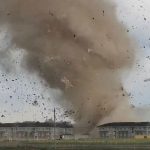Israel’s military has denied being behind the attack and said it was assessing the incident.
The death toll is expected to rise as casualties are still being transferred to the hospital, according to Mohammad Ghrab, a doctor at the emergency unit at Al Shifa Hospital. Earlier, a witness on the scene said dozens of people had died.
Graphic footage from the immediate aftermath of the scene filed by an eyewitness showed multiple bodies with traumatic injuries as well as pools of blood on a street strewn with rubble and dust.
The health ministry said the incident was “a result of the Israeli occupation forces targeting a gathering of citizens waiting for humanitarian aid to satisfy their thirst at the Kuwaiti roundabout in Gaza.”
“Medical teams are unable to deal with the volume and type of injuries reaching hospitals in northern Gaza due to weak medical and human capabilities,” the ministry said.
The attack took place amid a backdrop of extreme hunger and poverty in the besieged enclave due to Israel’s severe restrictions on aid entering Gaza, where more than a half a million people are on the brink of famine, according to UN agencies.
The Kuwaiti Roundabout in Gaza City has become known as an area where aid trucks distribute food, attracting crowds of people desperate for supplies.
The Israel Defense Forces (IDF) denied it was responsible for the attack, in a short statement to CNN on Friday.
“The reports that the IDF attacked dozens of Gazans at an aid distribution point are false,” the statement said.
The Israeli military said it was assessing “the incident with the thoroughness that it deserves.”
Eyewitnesses said the area was struck by what they said sounded like tank or artillery fire.
Gaza Civil Defense Spokesman Mahmoud Basal accused Israel of being behind the attack in a statement late Thursday.
“The Israeli occupation forces are still practicing the policy of killing innocent citizens waiting for relief aid as a result of the famine occurring in the northern Gaza Strip,” Basal said in a statement.
Israel has for months limited the flow of aid into Gaza, however, some trucks have been allowed into the northern part of the strip where hunger is most acute. Amid a collapse of public authority in Gaza, the arrival of aid trucks has sparked chaos and disorder that often leaves thousands at risk of harm during the distribution.
Attacks on civilians at aid stops
The incident at the Kuwaiti Roundabout followed earlier violence at the same site on Wednesday, where large crowds were waiting for a food distribution.
At least seven people were killed and 86 others injured after Israeli troops opened fire, according to health official and eyewitness.
Fathi Obaid, a doctor at Al Shifa’s emergency department said that many of the people who were transferred to Al Shifa after the incident suffered bullet wounds and the hospital was struggling to treat all the patients because of a shortage in medicine and medical equipment.
Nimr Abu Atta, a patient at Al Shifa who was shot in the abdomen, said he had been hit with “gunfire from an Israeli tank.”
Abu Atta said he went to the Kuwait Roundabout to pick up some flour for his children when he was hit. “My wife was killed two months ago in the war, and I am caring for my seven children,” he said.
The IDF has not yet responded to a CNN query about the earlier incident. Israeli soldiers are routinely stationed near the landmark.
Several deadly attacks by Israeli soldiers on crowds of civilians lining up for aid have been reported in recent weeks.
The Gaza-based Government Media Office said Tuesday at least 400 people have been killed in several similar incident since the beginning of the war.
“The targeting of those who are searching for aid to help satisfy their children’s hunger has intensified, especially in northern Gaza,” head of the media office, Salameh Maarouf said in a statement.
CNN cannot independently confirm the Gaza government’s numbers due to the lack of international media access to the strip.
The United Nations Office for Coordination of Humanitarian Assistance (OCHA) said Monday it had documented 14 such incidents at two entrances of Gaza City between mid-January and the end of February, and at least 11 additional incidents between 1 and 8 March, during which at least 28 Palestinians were reported killed.
Last month, more than 100 people were killed in one of the worst single tragedies to occur during Israel’s war with Hamas. Israeli troops opened fire near civilians gathering around food aid trucks in northern Gaza, and many of the victims were fatally run over by trucks in the ensuing panic, in what has become known locally as the “Flour Massacre.”
Extreme hunger
More than 30,000 people have been killed in Gaza, according to the Palestinian Ministry of Health, and the remaining population has been forced from their homes as Israel’s war against Hamas stretches into a sixth month.
The latest conflict in Gaza was triggered by attacks on southern Israel by Hamas gunmen in which more than 1,200 people, mostly civilians, were killed and more than 200 people taken hostage.
Gaza’s entire population of roughly 2.2 million people are facing “crisis or worse levels of acute food insecurity,” according to the World Food Programme, which recently warned child malnutrition in the enclave is “higher than anywhere in the world.”
Food shortages are reportedly the worst in northern Gaza, where Israel concentrated its military offensive in the early days of the war. Child malnutrition in the region is about three times higher than in southern Gaza, according to the World Health Organization (WHO).
Displaced Palestinians told CNN they are struggling to feed their children. Starving mothers are unable to produce enough milk to breastfeed their babies, doctors say. And parents arrive at overwhelmed health facilities begging for infant formula.
Israel insists there is “no limit” on the amount of aid that can enter Gaza, but its inspection regime on aid trucks has meant that only a tiny fraction of the amount of food and other supplies that used to enter Gaza daily before the war is getting in now.
Jamie McGoldrick, a UN humanitarian coordinator who returned from a two-day trip to Gaza, warned Wednesday that hunger there has reached “catastrophic levels.” Adele Khodr, regional director of the UNICEF office in the Middle East and North Africa, said “people are hungry, exhausted and traumatized. Many are clinging to life.”


